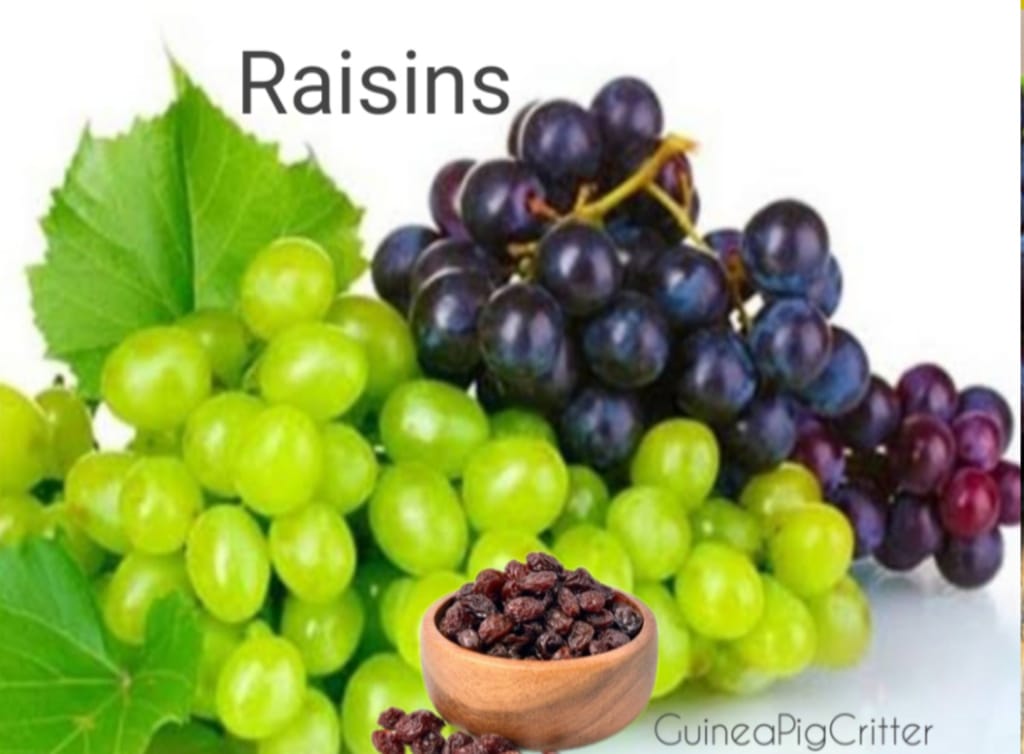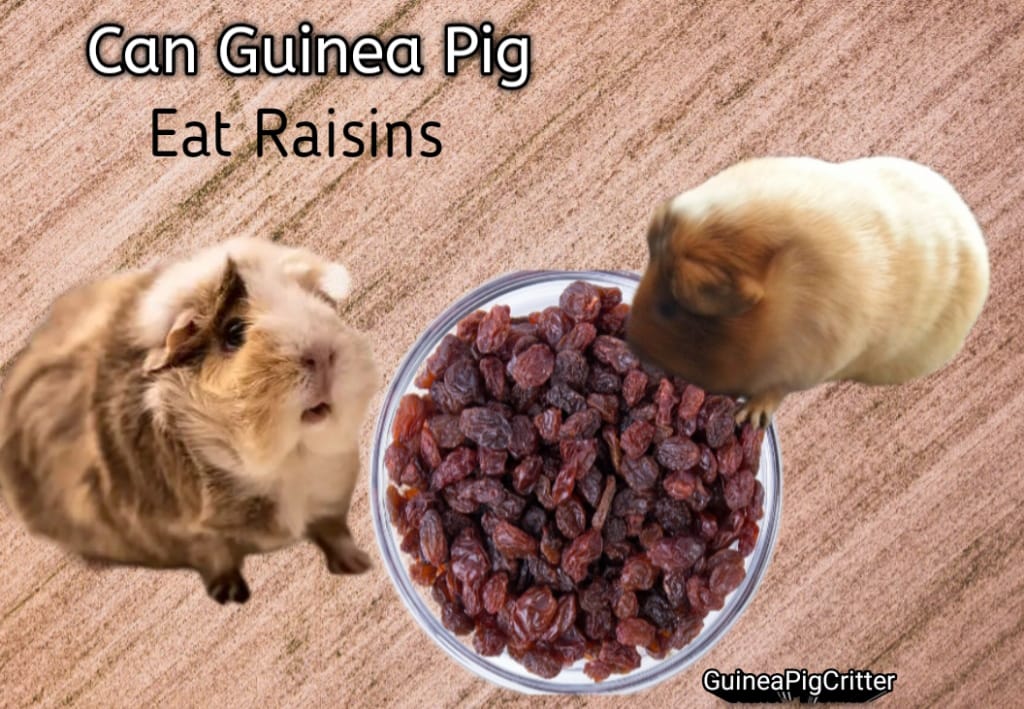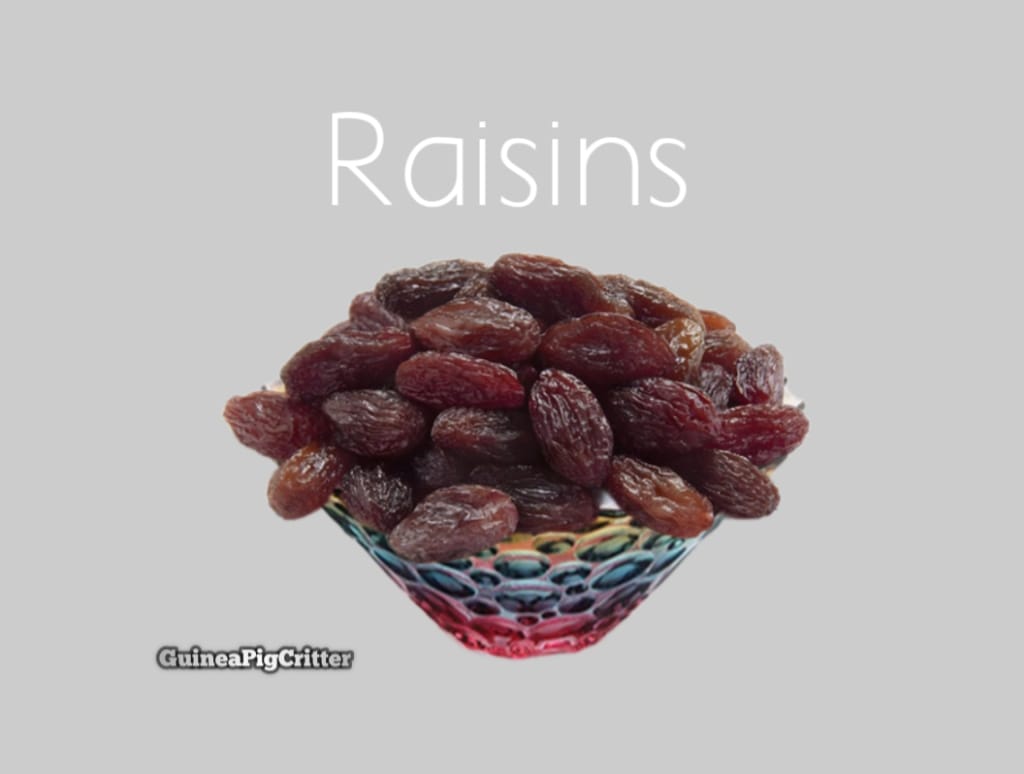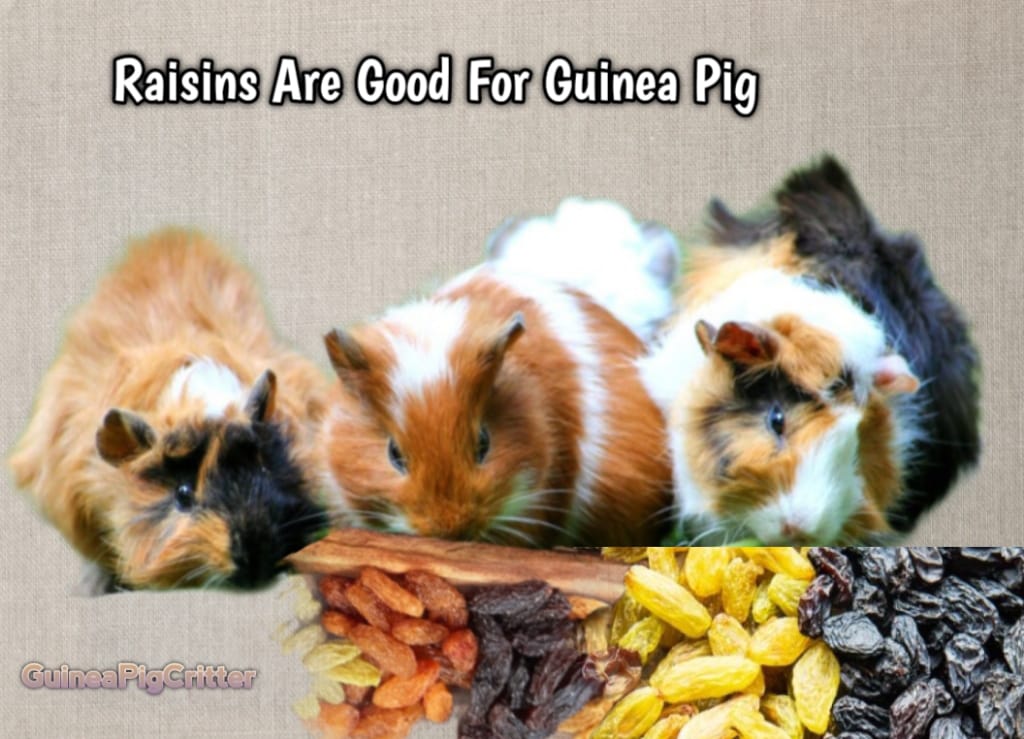While raisins are not poisonous to guinea pigs, they have many health hazards that make them an unsuitable snack. These dried grapes contain large amounts of sugar which makes them responsible for conditions such as obesity, diabetes and dental problems in guinea pigs.
Their bodies cannot tolerate the concentrated sugars in raisins and so it can cause digestion issues like diarrhea and bloating.
Moreover, raisins are small and sticky and thus can potentially cause choking. This is one reason why it is easy for guinea pigs to choke on food that is not right sized or textured for their small mouths and throat.
Furthermore, relatively high levels of calcium are found in raisins which may lead to the development of bladder stones in guinea pigs. Accordingly, this condition is highly painful and serious necessitating intervention by a veterinary officer.
Rather than raisins, one should consider other better treat options with moderate fresh vegetables such as bell peppers cucumbers fruits include apples strawberries etcetera. Thus these alternatives provide necessary nutrients without high sugar content and its attendant risks related into eating raisins.
Always ensure your pet’s health by giving priority on diets rich in hay, fresh vegetables, and special formulated pellets for guinea pig.
Can Guinea Pigs Eat Raisins?
Raisins are more or less dried grapes with this process of dehydration which makes them more concentrated in their natural sugars and nutrients. They have different types of nutrients that could be healthy for humans but not necessarily for guinea pigs. Their digestive systems differ from those of humans, and some food that is good for us can actually be toxic to guinea pigs.
The first risk for guinea pigs if raisins are given to them is the high sugar content involved. Many guinea pigs cannot handle much sugar, therefore taking sugary substances can lead them to have a number of health problems including obese, diabetic and having difficulties digesting foods. Moreover, the small size of raisins makes it easy to overfeed your cavy, thus fast tracking these health issues.
Another major factor to consider is the choking hazard. Despite the fact that raisins are small-sized fruits they are sticky in nature hence they can only stick in through a guinea pigs throat causing a dangerous choking accident. This single danger alone would make numerous pet owners reconsider giving their pets these as treats.
So, today question is: – Are Raisins Good for Guinea Pigs?
In conclusion, raisins do not kill guinea pigs although their high sugar amount and potential chocking risk contraindicate their consumption by animals. When it comes to selecting treats for your rabbit it’s ideal to play safe and go for healthier alternatives rather than risking on unsafe ones.

Nutritional Information Regarding Raisins
To better understand why raisins may not be the best treat for guinea pigs, it is important to know their nutritional composition. Below is a detailed look at what constitutes raisins and how these parts could impact your pet.
Fiber-Rich: Raisins are praised for their high fiber content that aids digestion. This means that fibers can help maintain good movement of bowels which helps in preventing constipation. Guinea pigs derive most of their roughage from hay, which forms the main part of their diet. A little extra fiber from treats can be important but excess amounts upset guinea pigs’ stomach.
Laden with Antioxidants: These are compounds that counteract oxidative stress as well as reduce inflammation hence they are crucial in maintaining the entire body health and also preventing some diseases. On the other hand, although raisins have a lot of antioxidants, guinea pigs can get enough antioxidants from fruits and fresh vegetables that match well with them in terms of dietary requirements.
Calcium-rich: Calcium is required for healthy bones. However, too much calcium might cause bladder stones formation among guinea pigs whose calcium needs are specific; this condition is both painful and life-threatening. For instance, raisins have relatively higher content of calcium making them unsuitable for guinea pigs who need strict control on intake so as to balance calcium levels.
Magnesium is rich in: muscles and nerves require magnesium. It’s one of the most important nutrients but guinea pigs usually get enough of it from their regular food, especially when they are given a combination diet of hay, vegetables and specially made guinea pig pellets.
Low Calorie Content: raisins have low calories but this may be misleading. They contain high amounts of sugar which can lead to weight gain and other health problems despite having very few calories when eaten in large quantities.
High Potassium Levels: potassium is necessary for proper heart functioning and muscle contractions. However, even without the sugars that come with raisins, guinea pigs get adequate potassium from their everyday foods.
These findings indicate that while raisins have some beneficial qualities, such as high nutritional value, too much sugar and over feeding hazards make them unsuitable for guinea pigs. The right thing to do is to offer these nutrients through appropriate dietary sources that match up with the cavy’s dietary requirements.
The Risks Involved in Feeding Raisins to Guinea Pigs It may appear harmless giving raisins to a pet guinea pig as a treat however, several risks come along with this action and they can be harmful for your pet’s life. To understand these hazards will help you choose well on what your guinea pig should eat.
Sugar is a major drawback of raisins: because most raisins are made up of sugar. Guinea pigs are not designed to consume large amounts of sugar since they have a digestive system that can’t handle it. Eating foods with high sugar content like raisins may result in serious health problems such as obesity, diabetes and oral cavity diseases. A guinea pig that is obese is going to find it hard to run around and go about its normal activities thereby reducing the quality of life for them. Diabetes, even though it’s less likely to happen in guinea pigs, can be a dangerous disease which is difficult to manage.
There is an alarming number of raisins for overfeeding: due to being tiny and delicious, raisins are easy to feed excessively. If you use them as treats, one can easily forget how many they have given him or her already. The above conditions may develop so fast following overusing this type of food so keep an eye on their consumption.
Choking: Guinea pigs are at risk from choking because raisins are small and sticky. The little airways may become blocked by just a single piece thus leading death-threatening situation for the poor animal health-wise; with this alone being enough reason why one ought not give raisin to these creatures.
Digestive Disruption: When you give raisins to your guinea pig, their high sugar content and dense nutrients can cause digestive problems. The digestive system of a guinea pig is designed for processing fibrous plant matter since it is an herbivore. Thus, when such foods that are rich in sugar and other nutrients, such as raisins, are introduced into their systems, they disrupt the natural flora leading to diarrhea or bloating.
Long-term Health Hazards: Guinea pigs may develop health complications from frequently giving them raisins or other sugary treats. If they become chronically overweight or diabetic, they will have shorter lives and poorer quality of life. In addition, excessive calcium consumption may lead to painful bladder stones which may require surgical correction.
From these dangers it becomes quite evident that raisins are not a correct choice of goodie for guinea pigs; there exist many other options which have great nutritional benefits minus any danger accompanying them.
How Many Raisins Can Guinea Pigs Have?
However, if you would like to offer raisin as a treat every once in a while then this important to do so with caution. Thereby reducing intake amounts and frequency may minimize chances of perilous situations occurring.
One at a Time: If you want to give your guinea pig raisins, limit it to only one at a time. This little amount should be given very sparingly, maybe once monthly or less often.
Watch the behaviors of your pet: After giving your guinea pig raisins, watch them for any unexpected behavior. Such as different behaviors that they show if they have an upset in their stomachs or if they feel uncomfortable in any way. In case of any problems during this period, stop giving them and raise your concerns with a veterinarian.
Take into account health issues: For those guinea pigs that may have previous health conditions especially ones related to digestion or weight, avoid raisins completely. These pets are more prone to effects of sugary like raisins and need closer dietary management.
Balance against other feed types: Ensure that the rest of the guinea pig’s diet is nutritious and balanced. Most of its food should consist of hay, fresh vegetables and specially processed pellets for the air pigs. Those foods give essential nutrients without health risks accompanied by sugary treats such as raisins.
In conclusion, though it might seem plausible to provide a raisin as an extremely occasional treat option, potential drawbacks tend to outweigh its merits. Usually it’s wise not consider having raisins but instead look for healthier choices that meet best needs of the diet of your guinea pig animal.

Raisins Substitutes
But you can treat your Guinea pig with various alternatives to raisins that are safer and healthier. These options contain the same nutritional value as raisins, but they don’t have high sugar contents.
Fresh Vegetables: Fresh vegetables can be used as treats for guinea pigs. They are low in sugar and rich in essential nutrients like:
Carrots: They are a great source of fiber and beta-carotene, although they have natural sugar hence feed them moderately.
Bell Peppers: As these pets can’t synthesize Vitamin C on their own, they need to eat bell peppers which contain this vitamin in large amounts.
Cucumbers: It is hydrating because it contains a lot of water and has fewer calories.
Fresh Fruits: Although fruits contain natural sugars, it is possible to give them little. Some safe options may include:
Apples: Pull out the seed then chop into small slices.
Strawberries: Since strawberries are full of antioxidants plus vitamin C offering small quantities is good enough.
Blueberries: They also have high concentration of antioxidants thus you should give them occasionally.
Herbs: Fresh herbs can make a tasty and nutritious addition to your guinea pig’s diet. Some safe herbs include:
Cilantro leaves: These leaves consist of minerals and vitamins
Parsley: It is rich in vitamin C so you must not offer it in big portions since its calcium level is very high too.
Mint: Mint tastes fresh and smells good so use it sparingly.
Commercial Guinea Pig Treats: There are special guinea pig treats that are given in a number of pet stores so as to meet their dietary needs. Such treats become handy and safe.
However, when introducing any new treat into the diet of your guinea pig, it is important that you do this gradually and in small amounts. If there is anything bothering, you concerning its food habits then make sure to do a consultation with your veterinary.
Observe the Following tips
To ensure your pet’s health and happiness when feeding him/her follow these rules:
Introduce New Foods Slowly: When bringing in a new treat or food item always introduce them slowly into your pet’s system. This way, their digestive system can adjust to it without suffering from any digestive upsets.
Lookout for Negative Reactions: After introducing new foods always observe any indicator of discomfort or change in behavior. Should such signs occur like upset stomach or other health problems, discontinue the new foodstuff immediately and call for vet assistance.
Give Them a Balanced Diet: The staple diet for most guinea pigs should be made up of hay which has essential fibers needed for digestion. The remaining portion of their meal consists of fresh vegetables and specially formulated pellets made for guinea pigs should be included. In between it is only nice if we give them some treats in little amounts once in a while.
Evade High-Sugar Foods: One should stay away from high-sugar foods such as raisins and other dried fruits. If given to guinea pigs, these types of food can make them become overweight, suffer from diabetes, or develop other complications.
Make Sure Your Pet Has Enough Water Every Day: Having fresh water for your guinea pig is important. Ensure that it has an access to fresh clean water all the time.

FAQs
Are Raisins Good for Guinea Pigs?
Although raisins are generally considered safe for guinea pigs, eating too many can cause digestive disorders and obesity due to their high sugar content. It’s better to choose less sugar-laden treats instead.
What Problems Can Giving Guinea Pigs Raisins Cause?
The major ones include excessive weight gain, diabetes, digestion problems as well as dangers of choking. Their high sugar levels along with over indulgence make raisins a poor selection for a pet like a guinea pig.
Are Other Dried Fruits Safe for My Guinea Pig Besides Raisins?
Generally speaking, dried fruits are high in sugar content and are not suitable for feeding guinea pigs. The best bet is offering fresh fruits in small servings. Always introduce new foods slowly and watch for any signs of ill health in your cavy during this period.
Can I Give My Guinea Pig an Occasional Raisin as a Treat?
It may not cause immediate harm to offer your guinea pig an occasional raisin, but the potential risks often outweigh the benefits. Instead of raisins, you should rather choose healthier treats that are aligned to its dietary needs.
Summary
In conclusion, raisins have no toxicity towards guinea pigs; however, their high sugar levels and various health hazards make them unsuitable as treats. There exist many more beneficial options that give nutritional value without the associated risks involved. Always place priority on your guinea pig’s health through well-balanced diet composed of hay, fresh vegetables and fruits with less sugar content. Adhering to these guidelines enables one to keep his or her guinea pig happy, healthy and with a balance nutrition.

